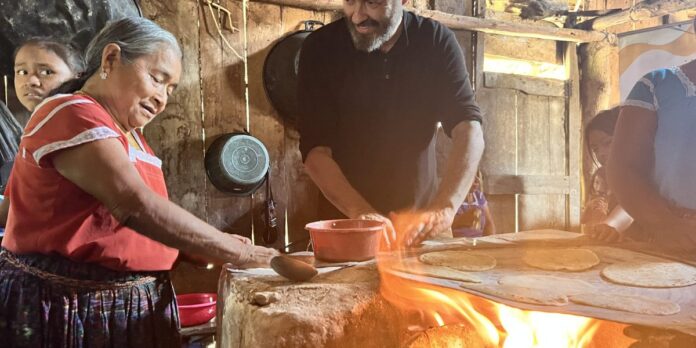When you save up for a meal at a renowned restaurant in a distant city, thoughts of philanthropy and sustainability may not usually cross your mind. However, for a chef based in Barcelona who recently won a significant culinary humanitarian award, addressing this issue is crucial.
Andres Torres, a former war correspondent, has transformed his experiences on the battlefield into a successful restaurant venture. Located in the Catalan wine region of Penedés, Torres runs Casa Nova as the head chef, offering high-quality cuisine to customers while urging them to consider the origins of their expensive meals.
This year, Torres was honored with the prestigious Basque Culinary World Prize and its €100,000 prize. The award is given to a restaurant that demonstrates a broader socio-economic impact beyond just cooking in the kitchen.
When he is not in the kitchen at Casa Nova, Torres devotes his time to managing the NGO Global Humanitaria, a non-profit organization that focuses on providing food and clean water sources in impoverished and war-torn regions.
While it may seem challenging for one person to run both a restaurant and an international humanitarian organization, Torres has found a way to intertwine the two ventures successfully.
Torres’s Michelin Green Star restaurant directs a portion of its profits towards Global Humanitaria. Inspired by his reporting and humanitarian work in places like Guatemala, Syria, and Ukraine, the food at Casa Nova reflects these experiences.
Through an interpreter, Torres explained to Fortune that his time reporting on conflicts helped him understand the impact of war on local food systems. As a self-taught chef, he believed the best way to communicate this to the public was through his culinary creations at Casa Nova.
Amid discussions on the negative aspects of tourism, Torres’s restaurant serves as an example of a concept that could educate and inspire more mindful travelers.
Conscious tourism
Residents of Barcelona have been vocal about their concerns regarding the surge in tourism across Europe, driven by the post-COVID-19 “revenge travel” trend. Apart from the city’s attractions like Gaudi’s architectural wonders, food tourism plays a significant role in attracting visitors to Catalonia.
In response to the influx of tourists, some locals in Barcelona have taken drastic actions to express their frustrations, such as squirting dining tourists with water pistols and chanting “go home” on Las Ramblas.
While reducing tourism to a level acceptable to locals may not be feasible due to its economic impact and open borders, the negative effects of over-tourism persist, affecting the quality of life and income of residents as accommodation is devoted to short-term rentals for travelers.
Barcelona is planning to ban Airbnb short-term rentals by 2029 to make more housing available for locals, though the impact on tourism remains uncertain.
As cities grapple with the balance between economic growth and local satisfaction, some are exploring ways to find a compromise between attracting tourists and addressing residents’ concerns.
While Barcelona residents have taken a stricter approach, the city of Copenhagen is adopting a positive strategy. The CopenPay program in Copenhagen rewards tourists with free experiences like museum visits, lunches, and kayak tours in exchange for community service. For example, a Surf School offers free lessons to surfers who help clean beaches for 30 minutes.
Within Catalonia, Torres’s restaurant is at the forefront of the growing demand for conscious capitalism.
Torres has attracted attention from Gen Z visitors who admire his gastronomic and humanitarian efforts, even if they cannot always afford to dine at his restaurant.
The target audience, however, is affluent individuals who are willing to support Torres’s philanthropic initiatives. Some diners who visit Torres’s restaurant based on positive reviews end up engaging in conversations with the chef about the origins of their meals.
One wealthy diner made a donation to help Torres build a bunker for school children in Ukraine, seeking shelter from ongoing bombardment. Others dining at the restaurant may decide to support Torres’s humanitarian work after their meal.
During a recent experience, Torres witnessed Russian and Ukrainian citizens engaging in discussions about the conflict over dinner at separate tables.
Torres believes that more restaurants in Europe should prioritize sustainability, disclose the sources of their food, and offer tourists insights into both local and global ecosystems. If this approach becomes the norm, tourists may leave with more than just a full stomach.




